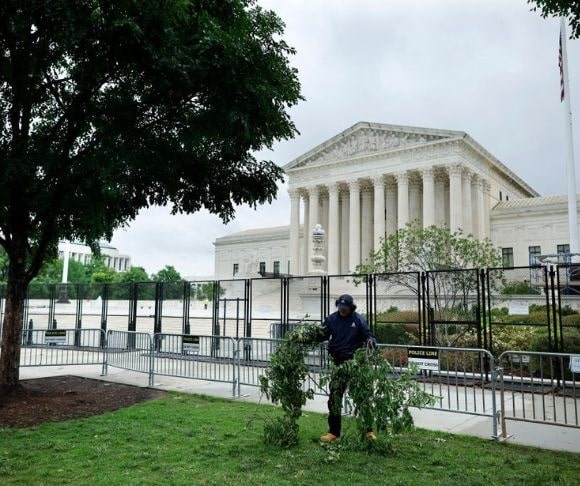The Supreme Court released opinions on Monday, June 13, and will do so again on Wednesday, June 15. The first closed five cases, but none of the blockbusters for which court-watchers have been waiting. And even more so since the leaked draft of Justice Samuel Alito’s opinion overruling the principal holding of Roe vs. Wade in the Dobbs vs. Jackson Women’s Health case.
Denezpi vs United States
Justice Amy Coney Barrett wrote the opinion of the Court, joined by Chief Justice John Roberts and Justices Clarence Thomas, Stephen Breyer, Samuel Alito, and Brett Kavanaugh. Justice Neil Gorsuch dissented in part, joined by Justices Sonia Sotomayor and Elena Kagan. The principal holding is that “[t]he Double Jeopardy Clause does not bar successive prosecutions of distinct offenses arising from a single act, even if a single sovereign prosecutes them.” Here we have somewhat strange bedfellows, and this case well illustrates Gorsuch’s departure from the conservative majority. He is much more libertarian.
Denezpi was accused of assaulting another member of the Navajo Nation in a proceeding in Colorado within the Ute Mountain Ute Reservation. Upon receiving a light sentence, Denezpi was prosecuted again, the second time in federal district court. Gorsuch wrote:
“It is hard to believe this Court would long tolerate a similar state of affairs in any other context— allowing federal bureaucrats to define an offense; prosecute, judge, and punish an individual for it; and then transfer the case to the resident U.S. Attorney for a second trial for the same offense under federal statutory law. Still, for over a century that regime has persisted in this country for Native Americans, and today the Court extends its seal of approval to at least one aspect of it. Worse, the Court does so in the name of vindicating tribal sovereign authority. The irony will not be lost on those whose rights are diminished by today’s decision.”
The following two cases, Garland and Johnson, concern a 1996 immigration statute that “states an unauthorized immigrant ‘may’ remain in detention for an extended period of time if he or she fails to meet certain criteria. Several detained immigrants sued the US government, arguing that because the statute says ‘may’ be detained rather than ‘shall’ be detained, it connotes discretion by judges and entitles them to a hearing.”
Garland vs Gonzalez
Alito wrote the Court’s opinion, joined by Roberts, Thomas, Gorsuch, Kavanaugh, and Barrett. Sotomayor dissented in part and was joined by Kagan and Breyer.
Held: Federal law “deprived the District Courts of jurisdiction in these cases to entertain respondents’ requests for class-wide injunctive relief.”
Johnson vs Arteaga-Martinez
Sotomayor wrote the Court’s opinion, joined by Roberts, Thomas, Alito, Kagan, Gorsuch, Kavanaugh, and Barrett. Justice Thomas wrote a concurrence joined by Justice Gorsuch, and Justice Breyer wrote separately to concur in part and dissent in part.

(Photo by Chip Somodevilla/Getty Images)
Here the Court ruled that “federal law does not require the Government to provide noncitizens detained for six months with bond hearings in which the Government bears the burden of proving, by clear and convincing evidence, that a noncitizen poses a flight risk or a danger to the community.”
Kemp vs United States
This was an 8-1 case with Gorsuch as the sole dissenter. Thomas wrote the opinion of the Court, joined by Roberts, Breyer, Alito, Sotomayor, Kagan, Kavanaugh, and Barrett. Sotomayor wrote a concurring opinion.
This case decided the simple question of whether the term “mistake” in Federal Rule of Civil Procedure 60(b)(1) “includes a judge’s errors of law.” The answer is important because a federal rule allows a party to a lawsuit to seek relief from a judgment based on a mistake. The Court considered “whether the term ‘mistake’ includes a judge’s error of law” and concluded that it does.
Once again, Gorsuch stood out in dissent. He argued the Court was wrong to take the case in the first place — both because it’s an issue that seldom arises and is therefore not a good use of Court resources, and, further, it is a proper matter for the legislature, not the courts:
“Questions like these are best resolved not through a doubtful interpretive project focused on a pronoun dropped in 1946, but through the rulemaking process.”
 ZF Automotive US, Inc. vs Luxshare, Ltd.
ZF Automotive US, Inc. vs Luxshare, Ltd.
Barrett wrote for a unanimous court in this consolidation of two cases involving foreign arbitration proceedings.
Although federal law permits a district court to order discovery “for use in a proceeding in a foreign or international tribunal,” only a governmental or intergovernmental adjudicative body may qualify as such a tribunal, and the arbitration panels in these cases are not such adjudicative bodies.
These cases will be joined by more on June 15, and other release days will be added to the calendar as the Justices work to clear their docket by the end of June when the Court breaks for summer recess.




